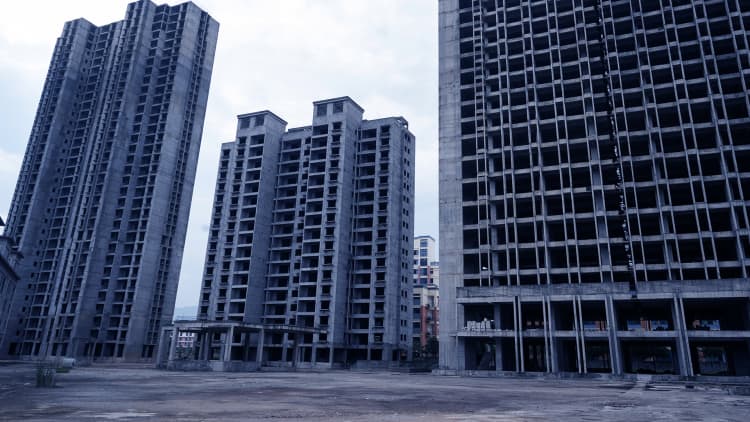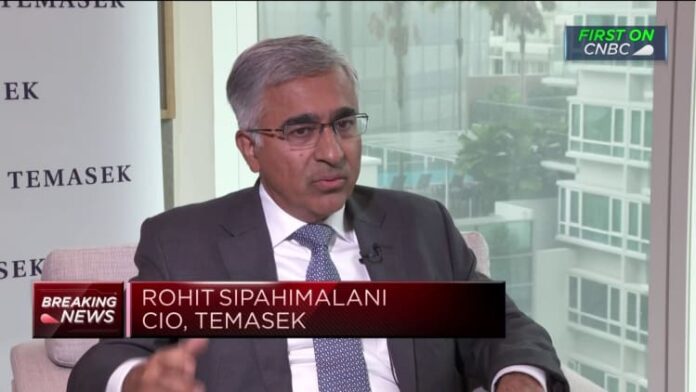Skyscrapers are seen in the West Coast New Area of Qingdao in China's Shandong Province on July 6, 2024.
Onlyphoto | Onlyphoto |
BEIJING — China's real estate problems may be daunting, but analysts expect the upcoming Third Plenum to focus on other areas – such as high local government debt and promoting advanced manufacturing.
The highly anticipated political meeting, scheduled to take place from Monday to Thursday, is a major gathering of top leaders of China's ruling Communist Party that normally only takes place every five years. This plenum was originally scheduled to take place last autumn but was postponed.
“The biggest challenge for Beijing is to find an alternative tax system as the current one, which is heavily based on land sales, is under severe pressure due to the collapsing land market,” Larry Hu, chief China economist at Macquarie, said in an email to CNBC.
He expects next week's meeting to focus on fiscal reform and other structural policies. Hu pointed out that stimulus measures – which can include real estate – are usually discussed at more regular meetings such as the one of China's Politburo, which is expected in late July.
“Apart from that, policymakers are also likely to reaffirm [their] Commitment to innovation, the so-called new productive forces,” Hu said, referring to Beijing's efforts to support advanced manufacturing and high technology.
The Central Committee of the ruling Communist Party of China, which consists of more than 300 people, including full and alternate members, usually holds seven plenary sessions in each five-year term.
The Politburo is a group of about 24 people within this committee.
The Politburo Standing Committee, which consists of seven key members, is China's highest power circle and is headed by Xi Jinping, the party's general secretary and president of China.
The Third Plenum, which will take place from July 15 to 18, is one of the most important political meetings of the Communist Party of China.
Bloomberg | Bloomberg |
The Third Plenum has traditionally focused on economic policy. Under Deng Xiaoping's leadership in 1978, the meeting officially ushered in major changes for the communist state, such as China's “reform and opening up.”
At next week's plenary session, “my main focus will be on so-called financial reform,” Dan Wang, chief economist at Hang Seng Bank (China), told CNBC.
It will also pay attention to details of banking sector consolidation and signals regarding local governments' financial and tax policies.
“I do not think that the real estate markets should be a focus of the plenary session, because they are already [in a] make sure everyone has a consensus [on]said Wang. “It is in a downturn. The bottom has not been reached yet.”
Links to local government finances
While the real estate sector's problems are linked to the prosperity of most Chinese households, they are also linked to the finances of local governments and their mountains of hidden debt.
In the past, local governments relied heavily on land sales for revenue.
“In the medium and long term, the importance of developing sustainable revenue sources for local governments will increase,” HSBC analysts said in a June 28 report looking ahead to the Third Plenum.
“Expanding direct taxes on, for example, consumption, personal income, property, etc. is often seen as a solution. Among these options, a consumption tax could be the most effective,” the analysts said, noting that it could encourage local authorities to boost consumption.
Given the low level of confidence in the private sector, we believe that transitions need to be carefully planned and implemented at this time…
However, it is not necessarily so easy to lift the mood. In the weeks leading up to the plenary session, Chinese stocks slipped closer to the correction zone – or more than 10 percent from their recent high.
“We believe that given the low level of confidence in the private sector, the transition phases need to be carefully planned and implemented at this time, otherwise they could work in the opposite direction to a supportive fiscal policy,” HSBC analysts said.
Attempts to curb general financial risks have led to further restrictions across the banking and financial sector. Since the establishment of the latest Central Committee in October 2022, the Chinese Communist Party has strengthened its oversight of the financial and technology sectors through new commissions.
“The real estate sector has become so big that it absorbs all of China's resources,” Yao Yang, professor and director of the China Center for Economic Research at Peking University, said last month, according to a CNBC translation of his speech into Mandarin.

In his view, the excessive growth of the financial sector is the reason for the hollowing out of the US industrial sector.
“For China to compete with the United States, we need to expand manufacturing and technology,” Yao said. “Consequently, we need to restrict the financial industry, including the real estate sector. This is the real reason for the tightened regulations in the real estate and financial sectors.”
Goldman Sachs analysts said in a report last month that average salaries at brokerage firms, which cover about 0.1 percent of China's urban population, fell nearly 20 percent in 2022 and had already fallen slightly last year.
Combined with the far larger impact of strained local government finances, analysts found that wage cuts in the financial and public sectors dragged down wage growth in cities by about 0.5 percentage points annually in 2022 and 2023.
Separately, China is reportedly planning to cap annual salaries in the financial industry at around three million yuan (about $413,350). The cap would apply retroactively and require workers to hand over excess earnings to their companies, the South China Morning Post reported last week, citing people familiar with the matter.
China's financial regulator did not immediately respond to CNBC's request for comment.
Long-term goals, existing challenges
The official announcement of the third plenary session said the leaders would discuss “deepening reforms in a comprehensive manner and promoting China's modernization.” The statement mentioned China's goal of building a “high-standard socialist market economy” by 2035.
Beijing said such “socialist modernization” would include the per capita GDP of “moderately developed countries” in 2020, an expanded middle class and a reduction in differences in living standards.
This will be no easy task, especially after the shock of the Covid-19 pandemic and rising geopolitical tensions. According to the World Bank, China's GDP per capita last year in constant dollars was $12,174 – less than a fifth of the US GDP at $65,020.
A slowing economy may bring fewer opportunities and more concerns about inequality and justice than before.
Income inequality is a global problem, but new research shows that people in China are significantly discouraged by perceived “inequality of opportunity,” according to surveys conducted since 2004 by teams led by Martin King Whyte of Harvard University and Scott Rozelle of Stanford University.
The latest survey found that, regardless of income bracket, more respondents felt that their families' economic situation had worsened in 2023 compared to previous years.
“It may be that a slowing economy means fewer opportunities and raises more concerns about inequality and equity than before,” said a summary of the survey by Big Data China. “In other words, inequality may be more acceptable when the pie is growing very quickly, but it becomes less acceptable when the economy weakens.”

















